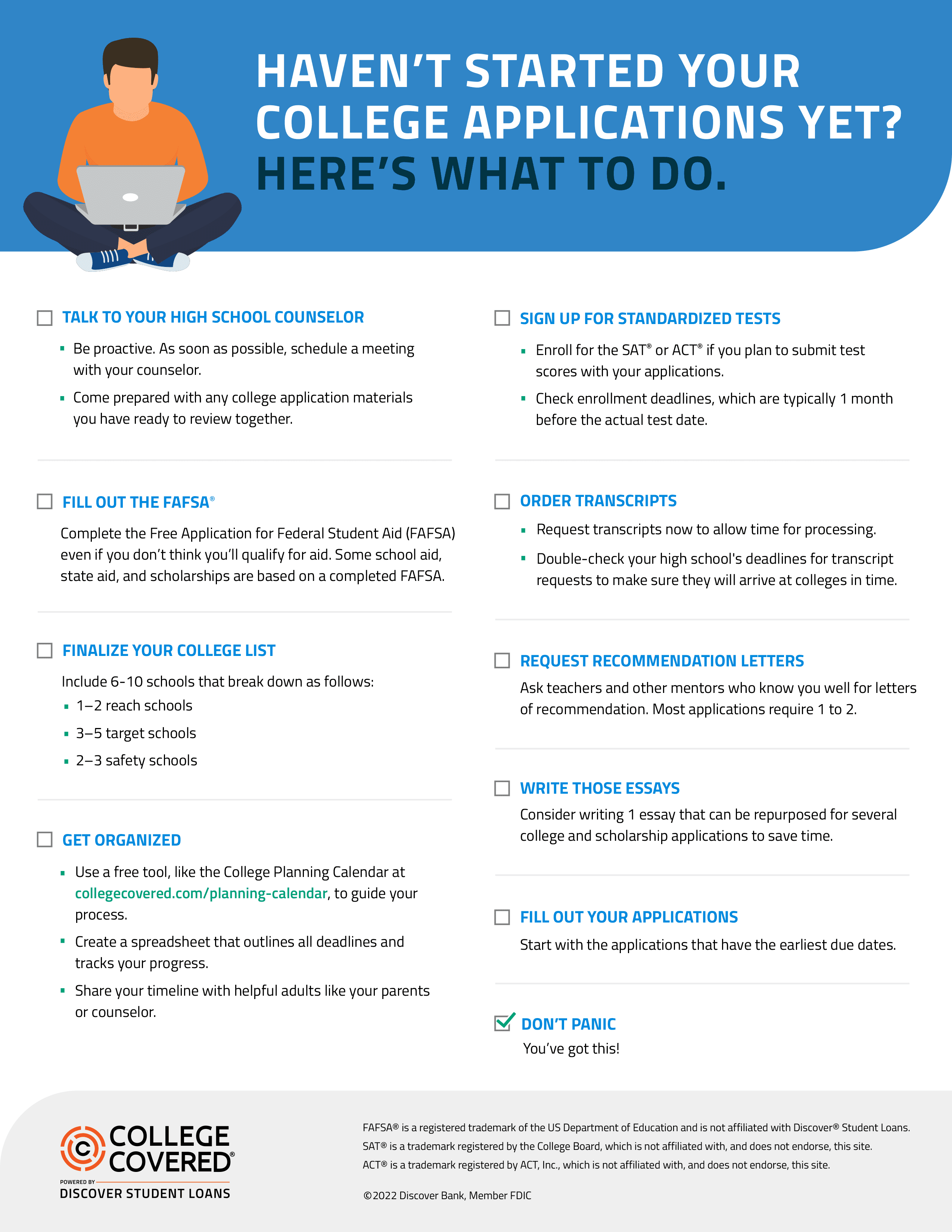If you haven’t started preparing your college prep process, no doubt the panic is setting in.
Don’t let it! “There’s still plenty of time,” says Suzanne Rossi, college coach and founder of Rock Your Future. “Don’t make decisions out of desperation,” she continues. “It’s too important of a decision, and the amount of investment in time, energy, and money is too great.” Instead, take a step back—and a long, deep breath—assess your options and launch your action plan.
To help, we’ve outlined key steps to take right away.
Talk to Your High School Counselor
If you have a high school counselor, they’re going to be your number one resource and the first person you want to involve in your application process. Plus, there may be forms and letters your counselor needs to complete on your behalf. “I like to remind students that the path out of the counselor’s office is the same path that leads in,” says Geoff Heckman, school counselor at Platte County High School in Missouri. In other words, “If you want to head off to college, head in here!” Heckman also says students, especially those on a tight schedule, need to be proactive. “Don’t wait for your school counselor to say, ‘Hey, where are you?’ Contact them.”
Fill Out the FAFSA®
Everyone needs to fill out the FAFSA (Free Application for Federal Student Aid). Even if you don’t think you’ll qualify for aid, you should still complete the form as some school and state aid is based on having a completed FAFSA.
“I recommend students and parents have it done before they go into winter break,” says Heckman. When it comes to the FAFSA, the general rule is: The earlier the better. Some schools award aid on a first-come, first-served basis, so getting it in sooner could help you receive a bigger financial aid package.
Organizing the smaller pieces of the application process helps provide a guide and takes the pressure off.
Suzanne Rossi
Get Organized
Applying to college means corralling a lot of moving parts. The more organized you are from the start—no matter when that start is—the easier it’ll be to stay on track. “Organizing the smaller pieces of the application process helps provide a guide and takes the pressure off,” says Rossi. Start with a tool, like the College Planning Calendar, and create a to do list or spreadsheet for general application materials, school-specific items, and scholarship applications. If your parents are part of your application process, make sure they can access this list as well.
Make Your College List
If you’ve missed the early decision deadline, there are still options available like general admission and Early Decision II. That leaves thousands of schools you could apply to. You need to narrow those options down to your college list of 6 to 10 schools. If that feels like an overwhelming task, Cindy Morton, a school counselor for Rockdale Virtual Campus in Conyers, Georgia, has a helpful tip. She sends students pressed for time to this College Search Tool from the College Board® to quickly identify schools that fit the criteria they’re looking for. And of course your high school counselor’s expertise will come in handy here. They can ask you several key questions that will help shape your search and build a college list with a number of great options that match your needs.
Order Transcripts
Colleges usually need your official high school transcript, sent from your high school, as part of your application. It’s up to you to talk to your school’s registrar and get that process rolling—and time is of the essence. “Some [high] schools have a 10-day notice before they will send anything for a student,” explains Rossi. “So if you’re starting late and there’s a December 1 deadline for, say, sending in transcripts, you’re going to need to get that request in. I have one [high] school that if you didn’t get everything in before Thanksgiving, none of your documents for January 1 deadlines would be guaranteed to get there.” Find out if your high school has internal deadlines or turnaround times that you’ll need to factor into your planning process.
Ask for Recommendation Letters
Most applications require one to two recommendation letters, which doesn’t sound like a lot, but depending on the size of your school, yours might be one of dozens of recommendation letters a teacher is asked to write. The longer you wait to add your name to a teacher’s pile of recommendation requests, the greater the odds that your teacher won’t get to it or won’t have time to write you the glowing letter you deserve. If you wait too long to ask for a recommendation, chances are you’re going to get a form letter, says Morton, adding, “and the colleges will know it’s a form letter.”
Write Those Essays
Without a doubt, essays are a time-consuming and, for many, an intimidating part of the application process. So it’s best to just get started. However, if you’re feeling stuck before you’ve written a single word, there are online resources that can help you beat writer’s block and pick your essay topic. Rossi offers this advice to students who are scared of writing: “It doesn’t need to be a masterpiece, and it’s not supposed to be an academic essay. It should reveal something about you that the rest of your application doesn’t.” Bottom line? “Don’t put too much pressure on it,” says Rossi, “but get started.”
Fill Out Your Applications
Start with the applications that have the earliest due dates and work down your list. And when you think you’re finished? Double-check everything! It’s also a good idea to have a friend or parent look over your work. Rossi says she’s often seen students accidentally select the wrong option from a drop-down list, which can impact the rest of the application. Don’t let careless mistakes and sloppy work affect your chances of getting in.
You’ve got this! Start your customized application checklist now and you’ll be on track in no time.
FAFSA® is a registered service mark of the US Department of Education and is not affiliated with Discover® Student Loans.
College Board® is a trademark registered by the College Board, which is not affiliated with, and does not endorse, this site.





